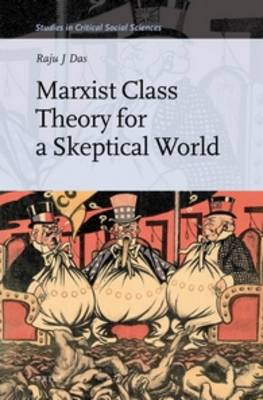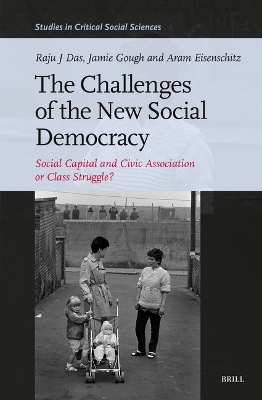Studies in Critical Social Sciences
4 primary works
Book 103
Marxist Theory of Class for a Skeptical World is a critique of some of the influential radical theories of class, and presents an alternative approach to it.
This book critically discusses Analytical Marxist and Post-structuralist Marxist theories of class, and offers an alternative approach that is rooted in the ideas of Marx and Engels as well as Lenin and Trotsky.
It presents a materialist-dialectical foundation for class theory, and conceptualizes class at the trans-historical level and at the level of capitalism. It shows that capitalism is an objectively-existing articulation of exchange, property and value relations, between capital and labour, at multiple geographical scales, and that the state is an arm of class relation. It draws out implications of class relations for consciousness and political power of the proletariat.
This book critically discusses Analytical Marxist and Post-structuralist Marxist theories of class, and offers an alternative approach that is rooted in the ideas of Marx and Engels as well as Lenin and Trotsky.
It presents a materialist-dialectical foundation for class theory, and conceptualizes class at the trans-historical level and at the level of capitalism. It shows that capitalism is an objectively-existing articulation of exchange, property and value relations, between capital and labour, at multiple geographical scales, and that the state is an arm of class relation. It draws out implications of class relations for consciousness and political power of the proletariat.
Book 151
In this book, Das presents a class-based perspective on the economic and political situation in contemporary India in a globalizing world. It deals with the specificities of India's capitalism and neoliberalism, as well as poverty/inequality, geographically uneven development, technological change, and export-oriented, nature-dependent production. The book also deals with Left-led struggles in the form of the Naxalite/Maoist movement and trade-union strikes, and presents a non-sectarian Left critique of the Left. It also discusses the politics of the Right expressed as fascistic tendencies, and the question of what is to be done.
The book applies abstract theoretical ideas to the concrete situation in India, which, in turn, inspires rethinking of theory. Das unabashedly shows the relevance of class theory that takes seriously the matter of oppression/domination of religious minorities and lower castes.
The book applies abstract theoretical ideas to the concrete situation in India, which, in turn, inspires rethinking of theory. Das unabashedly shows the relevance of class theory that takes seriously the matter of oppression/domination of religious minorities and lower castes.
Book 253
The world experiences rampant ideological/political lying and absence of genuine love. Capitalism utilizes lies to hide its contradictions causing people’s suffering which undermines genuine love. The right-wing capitalist politics is a politics of hatred, justified by lies. The analysis of love and lying, as aspects of capitalist culture, has important practical implications for the struggle for socialism.
Book 259
The Challenges of the New Social Democracy
by Raju J. Das, Aram Eisenschitz, and Jamie Gough
Published 10 July 2023
Raju J Das, Jamie Gough and Aram Eisenschitz provide a Marxist critique of new social democracy as the dominant contemporary strategy for local economic and social development. In both the global North and South, new social democracy seeks to develop social capital, strengthen civil society, build not-for-pro¬fit enterprises, encourage self-help, and foster community ties. It seeks participatory forms of local politics to achieve a local class consensus. It promises to improve people's economic and social conditions in the face of neoliberal capitalism, and to empower them. The authors argue that this strategy is severely limited by, and internalises, its capitalist environment. They show that social enterprise can be developed in socialist ways, and contribute to a local politics based in class struggle. But social capital cannot replace the struggle of the exploited and oppressed against capitalism and for a socialist society, a strategy which the authors outline for the local scale.



